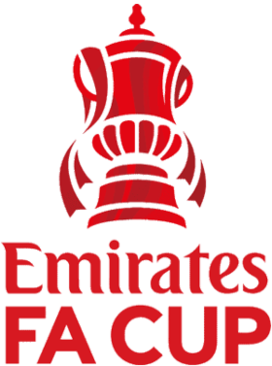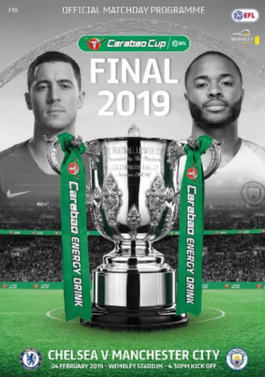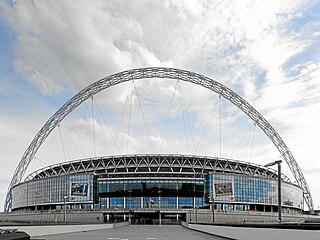
The Football Association Challenge Cup, more commonly known as the FA Cup, is an annual knockout football competition in domestic English football. First played during the 1871–72 season, it is the oldest national football competition in the world. It is organised by and named after The Football Association. Since 2015, it has been known as Emirates FA Cup after its headline sponsor Emirates. A concurrent Women's FA Cup has been held since 1970.

The EFL Cup, currently known as the Carabao Cup for sponsorship reasons, is an annual knockout competition in men's domestic football in England. Organised by the English Football League (EFL), it is open to any club within the top four levels of the English football league system—92 clubs in total—comprising the top-level Premier League, and the three divisions of the English Football League's own league competition.

The Football Association Community Shield is English football's annual match contested at Wembley Stadium between the champions of the previous Premier League season and the holders of the FA Cup. If the Premier League champions also won the FA Cup, then the league runners-up provide the opposition. The fixture is recognised as a competitive super cup by The Football Association and UEFA.
This article concerns football records in England. Unless otherwise stated, records are taken from the Football League or Premier League. Where a different record exists for the top flight, this is also given. This article includes clubs based in Wales that compete in English leagues.

The 2005–06 FA Cup was the 125th staging of the world's oldest football competition, the FA Cup.
The history of the FA Cup in association football dates back to 1871–72. Aside from suspensions during the First and Second World Wars, the competition has been played every year since.

The 1998–99 FA Cup was the 118th season of the FA Cup. The title defenders were Arsenal, who were eliminated in a semi-final replay by eventual winners Manchester United, who beat Newcastle United 2–0 in the final at the old Wembley Stadium. The goals were scored by Teddy Sheringham after 11 minutes, less than two minutes after coming on as a substitute for Roy Keane, and Paul Scholes on 53 minutes. It was the second leg of a historic treble for Manchester United; having already won the Premier League title the previous weekend, they went on to win the Champions League the following Wednesday.
The 1993–94 FA Cup was the 113th staging of the world and England's oldest cup competition, the Football Association Cup or FA Cup. The competition overall was won by Manchester United for the first time since 1990, with a 4–0 thrashing of Chelsea.
The 1995–96 FA Cup was the 115th staging of the FA Cup. The competition was won outright by Manchester United, who won the final through a goal from Eric Cantona five minutes from the end of the game. It gave Manchester United a league and cup double after they secured their third league title in four years. It was also United's third straight FA Cup Final.
The 1983–84 Football League Cup was the 24th season of the Football League Cup, a knockout competition for England's top 92 football clubs. The competition started on 29 August 1983 and ended with the final replay 28 March 1984.

The 2018 EFL Cup Final was the final association football match of the 2017–18 EFL Cup that took place on 25 February 2018 at Wembley Stadium. It was the first League Cup final contested under the "Carabao Cup" name following the sponsorship of Carabao Energy Drink. It was contested between Manchester City and Arsenal, and won 3–0 by Manchester City. They would have entered the second qualifying round of the 2018–19 UEFA Europa League, but instead qualified directly for the 2018–19 UEFA Champions League by finishing first in the 2017–18 Premier League.

The 2018 FA Community Shield was the 96th FA Community Shield, an annual football match played between the title holders of the Premier League and FA Cup. It was contested by Manchester City, champions of the 2017–18 Premier League, and Chelsea, the winners of the 2017–18 FA Cup, at Wembley Stadium in London on 5 August 2018. Manchester City won 2–0, with both goals scored by Sergio Agüero, who was named man of the match for his performance.

The 2019 EFL Cup Final was an association football match that took place on 24 February 2019 at Wembley Stadium in London, England, to determine the winners of the 2018–19 EFL Cup. It was contested by Chelsea and holders Manchester City, who retained their title with a 4–3 victory on penalties following a 0–0 draw after extra time; it was the first time Manchester City had successfully defended a title. As winners, they would have entered the second qualifying round of the 2019–20 UEFA Europa League, but instead qualified directly for the 2019–20 UEFA Champions League by finishing first in the 2018–19 Premier League. The final was also a rematch of that season's FA Community Shield which Manchester City won 2–0.

The 2019 FA Community Shield was the 97th FA Community Shield, an annual football match played between the winners of the previous season's Premier League and FA Cup. As Manchester City won both competitions in 2019, their opponents were the 2018–19 Premier League runners-up, Liverpool.

The 2020 FA Cup final, known officially as the Heads Up FA Cup final, was an association football match played behind closed doors between Arsenal and Chelsea at Wembley Stadium in London, England on 1 August 2020; it was originally scheduled for 23 May, but it was postponed due to the COVID-19 pandemic. It was the 139th FA Cup Final.

The 2022 EFL Cup Final was the final of the 2021–22 EFL Cup. It was played between Chelsea and Liverpool at Wembley Stadium in London, England, on 27 February 2022. The match saw no goals in the initial 90 minutes or the additional 30 minutes of extra time and went to a penalty shoot-out; each of the first 21 kicks in the shoot-out was scored before Chelsea goalkeeper Kepa Arrizabalaga missed his to give Liverpool an 11–10 victory and a record ninth EFL Cup title.

The 2022 FA Cup final was an association football match played at Wembley Stadium in London, England, on 14 May 2022. Chelsea and Liverpool were the finalists, the same as in the 2022 EFL Cup Final earlier in the season. This was the first time that the same pair of teams met in both the EFL Cup Final and the FA Cup Final of the same season since Arsenal and Sheffield Wednesday in 1993. Organised by the Football Association (FA), it was the 141st final of the Football Association Challenge Cup and the showpiece match of English football's primary cup competition. The match also marked 150 years since the first FA Cup Final was played in 1872. The match was televised live in the United Kingdom on free-to-air channels BBC One and ITV. In the UK, live radio coverage was provided by BBC Radio 5 Live and Talksport.

The 2024 EFL Cup final was the final match of the 2023–24 EFL Cup. It was played between Chelsea and Liverpool, in a repeat of the 2022 final, at Wembley Stadium in London, England, on 25 February 2024.













